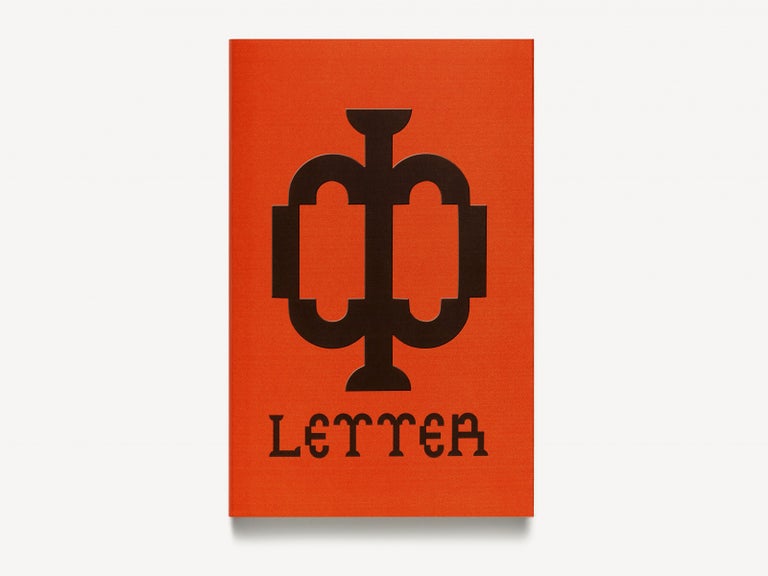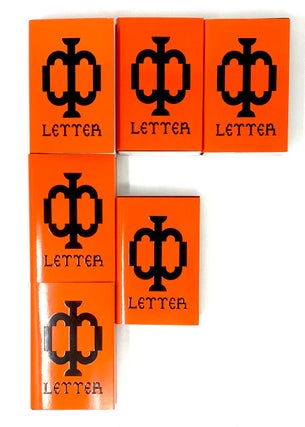F Letter: New Russian Feminist Poetry
isolarii, 2020.
New Book.Item #3248
Condition: fine, the color of the dust jacket slightly faded, a small crease in the corner of the book cover.
F Letter: New Russian Feminist Poetry, an anthology edited by Galina Rymbu, Eugene Ostashevsky and Ainsley Morse, with original poems by Lolita Agamalova, Oksana Vasyakina, Elena Georgievskaya, Egana Dzhabbarova, Nastya Denisova, Elena Kostyleva, Stanislava Mogileva, Yulia Podlubnova, Galina Rymbu, Daria Serenko, Ekaterina Simonova and Lida Yusupova; translated by Eugene Ostashevsky, Ainsley Morse, Helena Kernan, Kit Eginton, Alex Karsavin, Kevin M. F. Platt, and Valzhyna Mort.
F Letter: New Russian Feminist Poetry collects the work of a dozen women poets and feminist and LGBTQ+ activists associated with the Russian online platform F pis’mo. Galina Rymbu, its founder and co-editor, picked the poems and, after insistent requests by the English-language editors (us), added two of her own pieces. Rymbu is an exceptionally talented, deep-thinking, protean, and romantic poet who is rapidly acquiring a major international profile; she has recently received political-refugee status in Ukraine. Most other poets in the anthology live in Russia. Their work, indisputably controversial and groundbreaking in the Russian context, also has a lot to offer for poets and activists in the US. Wait, make that: unfortunately may soon have even more to offer for poets and activists in the US.
The F Letter anthology collects politically influential poems, such as the work of Lida Yusupova, inspirational for the Russian internet wave of #metoo discussions, Egana Djabbarova’s poem in support of the Khachaturian sisters’ case, or Galina Rymbu’s “My Vagina,” an explosive work in support of the activist Yulia Tsvetkova, whose childlike body-positive cartoons resulted in pornography charges. It also features the complex, meditative and stunning long poem by Oksana Vasyakina occasioned by the death of her father, a truck driver, of AIDS; the intense and philosophical love poetry of Lolita Agamalova, and a lot of other pieces that (we think) are among the most powerful poetic work created by Russian-speakers today.
What does it mean to be radical? It means to go to the root, radix. The root of our experience in the world is the body. The body, weirdly enough, has been a relatively uncharted territory for poetry. Dante takes three days to get through hell without eating, drinking or going to the bathroom. It’s not a trick everyone can pull off—and pretending you can is a fundamental distortion of human experience. Feminist and LGBTQ+ poetry in this book is meticulously concerned with embodiment: the poems directly embed bodies into social life, they talk about physical bodies as cohering into a social body, and as parts of the social body. Bodies and what they do—eat, fuck, shine, decline—become the intersection of political, cultural, social, and economic languages, and this lets the body be a powerful site of resistance.
We worked very closely with our varied and talented translation team. Apart from ourselves, our translators included the multilingual Belorusian-American poet Valzhyna Mort, Alex Karsavin, editor at Homintern magazine, Kit Eginton, editor of the Hypocrite Reader, Kevin M. F. Platt, founder of the Russian-American translation seminar Your Language My Ear, and Helena Kernan, first laureate of the Pushkin House translation residency for work with Rymbu. It also seems fitting that F-Letter is the second tiny book in a new series of “islands,” defined on the isolarii website as “points of orientation, mapping a scattered community that spans continents and disciplines. To represent a world of many worlds, not a globe.”
—Eugene Ostashevsky and Ainsley Morse
Berlin / Norwich.
Price: $20.00



